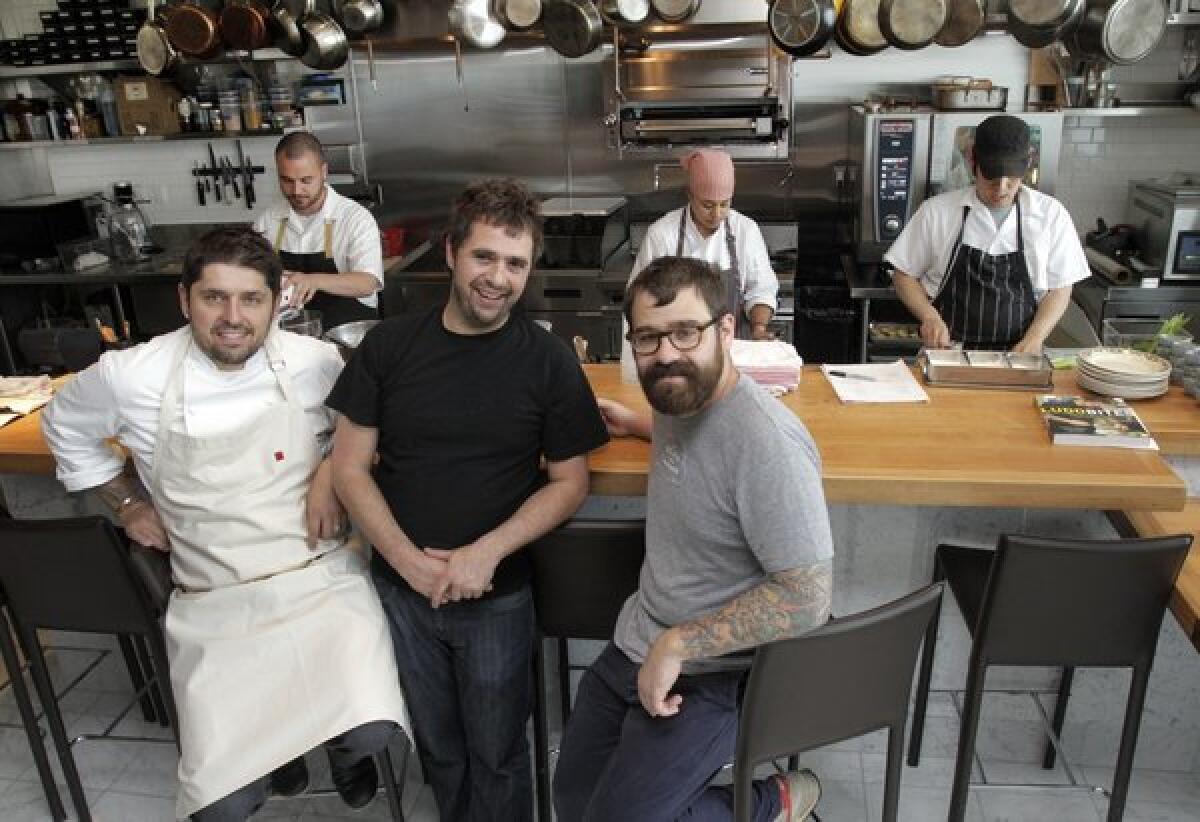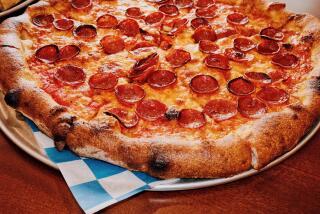At Trois Mec, diners must buy tickets upfront

Last month, the manager of the Beverly Hills restaurant Red Medicine shamed diners who didn’t turn up for their Saturday night reservations by calling them out on Twitter.
“I hope you enjoyed your GF’s Bday and the flowers that you didn’t bring when you no-showed for your 815 res,” Noah Ellis tweeted. “Thanks.”
But shame is only one tactic used by restaurateurs working to make sure their seats are filled each night.
This coming week, anyone looking to score a table at hotly anticipated Trois Mec, the new restaurant from celebrity chefs Ludo Lefebvre, Jon Shook and Vinny Dotolo, will have to buy tickets — just as they would for a movie or a concert.
The 26-seat Trois Mec, which opens Thursday in an unmarked former pizza joint in a Melrose Avenue strip mall, will be the first restaurant in Los Angeles to sell nonrefundable tickets online — nearly $100 with tax and tip (not including wine) — and is among only a handful of others in the world doing the same.
“We considered everything — no reservations, putting a deposit on a credit card,” says Krissy Lefebvre, Ludo’s wife and partner. “But people pay for tickets for entertainment. This just happens to be entertainment in the form of dinner.”
All over town, restaurants, which operate on notoriously thin profit margins, are in a battle with no-show diners, who increasingly are expected to bear more responsibility for their end of the bargain. Restaurants such as Urasawa in Beverly Hills require a credit-card hold with a $100-per-person cancellation fee. Saison in San Francisco takes it a step further; if you cancel within 72 hours of your reservation, you’re still required to pay the full cost of the meal (it has one menu, priced at $298 per person).
Public humiliation isn’t unheard of either. Red Medicine’s Ellis sparked controversy when he tweeted the names of several no-shows, but his isn’t the only restaurant to out customers who didn’t honor their reservations. A short-lived social-media campaign by restaurateurs in Australia employed the Twitter hashtag #noshowshame, attached to tweets with the names of people who shirked their reservations. And Rene Redzepi, chef of renowned Copenhagen restaurant Noma, famously blew up online when two tables no-showed and he tweeted a picture of him and his staff extending their middle fingers.
“The sad thing is we ran about 15% no-shows last Saturday night [post-shaming],” says Ellis, which is “where we typically were before. It’s frustrating because we haven’t found a great solution here, to be honest with you.”
Nick Kokonas, co-owner, with Grant Achatz, of Alinea in Chicago and its spinoffs Next and Aviary, says the answer, for some restaurants at least, is tickets. Kokonas spearheaded the ticketing system at Next, then adopted it at Alinea and is planning to roll it out for other restaurants under the name Next Table. It is the system Trois Mec is using, and also is used by Elizabeth restaurant in Chicago. (Leave it to a former derivatives trader to reconfigure the financial pact between restaurant and customer.)
“There were several surprising things to me when we opened Alinea,” Kokonas says, “and one of the most surprising was that people don’t mind canceling last-minute. They just assume you are going to fill the seat. It’s true of restaurants all over the world.” Even Alinea, with a 200-person waiting list, couldn’t always fill spots on short notice. Kokonas says he doesn’t condone Ellis’ response to no-shows, “but I understand how frustrated they were.”
Making a reservation “is like an unwritten contract,” says David Chang, the chef behind the Momofuku empire of restaurants in New York, Toronto and Sydney. It helps restaurants anticipate how much food and staff are needed on a given night, and diners know that they’ll be able to sit at a table at a certain time (which doesn’t always happen, especially if restaurants overbook — usually in anticipation of no-shows).
But diners are human: Sometimes they forget or get sick. “Diners for the most part are benevolent. They don’t wake up in the morning thinking, ‘I’m really going to screw this restaurant over and not cancel,’” says Alexander Kvamme, founder of online reservations service Seatme.com, who has noticed more restaurants that require credit-card holds because of no-shows. “It’s really an unfortunate position for restaurants. Every empty seat because of a no-show really costs you.”
At Trois Mec (“three guys” in French), which has only four tables and eight bar seats, if “one table doesn’t show up for each seating, that’s more than 10% of our business,” says Krissy Lefebvre. “It’s an inventory issue as well. We order based on exactly what those guests need — to be able to provide the best possible experience. Then there’s labor costs. If a table doesn’t show up, we’ve probably overstaffed by one person.”
“The only way you can really prevent a no-show is having people pay ahead of time,” says Momofuku’s Chang. Though he says he hopes that tickets are the future of dining, he hasn’t instituted them at his restaurants such as 12-seat Momofuku Ko (a notoriously difficult online-only reservation). But he is especially intrigued by dynamic pricing, which means paying a premium for seats that are more in demand — a table for Saturday night at 8, for example, would cost more than a table for Wednesday at 5:30 p.m.
That’s how it works at Next, which sold nearly $20 million in tickets in the last two years, Kokonas says. But Next and Alinea are considered two of the best restaurants in the country, offering experiences on the level of theater. Their menus are set; everyone who buys a ticket gets the same elaborate, multi-course meal.
For certain restaurants with a la carte menus, “I just think it’s really tricky,” Red Medicine’s Ellis says. But Kokonas is betting that others will innovate to fit their own circumstances. “It’s not just for the Alineas of the world but the little Chinese place down the street.”
Lack of ticket demand isn’t a likely problem for Trois Mec. Because of the popularity of LudoBites, the pop-up dinners that brought Ludo Lefebvre culinary fame, the Lefebvres ended up using a lottery system for reservations for the last few series. Thousands of would-be diners trying to get a spot at LudoBites have been known to crash reservation systems.
Trois Mec tickets will be available on the restaurant’s website, where a customer has to register with a user name and password before making a purchase. Registration starts Tuesday, and tickets for the next two weeks go on sale at 8 a.m. on Wednesday for parties of up to six at two rolling seatings (between 6 and 6:45 p.m. and between 8 and 9 p.m.). Tickets will then be released every two weeks on Fridays at 8 a.m.
It’s $75 for a five-course menu, including dishes such as potato pulp with milk skin, brown butter, bonito, onion soubise and Salers cheese from Auvergne; chicken and asparagus with mustard flower mustard, pancetta and brioche; and strawberries with almond ice cream, rhubarb, rose ice and olive oil cake. The total ticket price including an 18% service charge and tax is $97.13, and beer and wine will add to the tab. There are no refunds or exchanges, but diners can sell their tickets and then transfer them on the Trois Mec site.
Now someone has to figure out how to get Angelenos to dinner on time. At Trois Mec, service will start whether all the members of your party have arrived or not. It’s like baseball, says Ludo Lefebvre. “If you’re late, the game’s starting anyway.” Even if it is bumper-to-bumper on the 101.
More to Read
Eat your way across L.A.
Get our weekly Tasting Notes newsletter for reviews, news and more.
You may occasionally receive promotional content from the Los Angeles Times.











